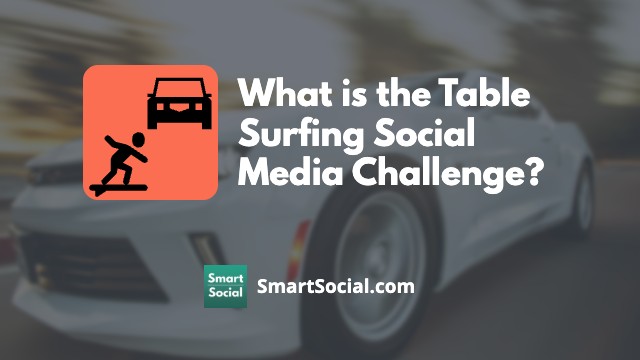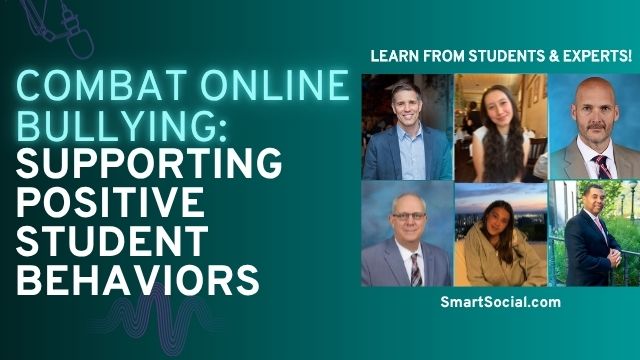Social Media and Body Image: How to Talk to Students
Green Zone App
(Click here to learn more)
Dangerous Social media challenge
(Click here to learn more)
Red Zone App
(Click here to learn more)
Gray Zone App
(Click here to learn more)

It comes as no surprise to many parents and educators that social media has a major impact on a child’s self-esteem. Research shows that teens who spend more time on social media had 2.2 times the risk of reporting concerns over eating and body image, compared to their peers who spend less time on social media. So, it’s important for parents to learn how to talk to their children about social media and body image, create a supportive environment, and teach them how to avoid the negative effects of social media. We asked 3 experts to share their best tips for parents who want to help their children develop a healthy relationship with screen time.
1. Remind your children that social media does not show the complete picture

Kayce Bragg, MA, LPC-SC, NCC, Synergy eTherapy
Parents, it is our job to teach our children how to have a healthy relationship with social media! Help them to understand the value these tools can have in our lives:
- Staying connected to those we love and potentially wouldn’t keep in touch with in-person, helping us to be less isolated. It’s a great way to maintain friend and family relationships without having the physical time to arrange meetings.
- Getting information out to others quickly. E.g., “hey everyone, mom was in a car accident but she’s okay! Don’t worry!”
- Gaining other viewpoints and perspectives in an effort to shape our own outlooks. We have access to so much information and if used correctly, it can help us be well-rounded and informed individuals.
- Sharing moments that make us who we are, with the people we care about and want to be involved in our personal journeys. “My team won the big game last night! Alright! Go Cougars!”
The flip side is that we also have to teach them how this tool can be a dangerous weapon in their own hands and how to not fall into these traps:
- Avoid comparing yourself to others and understand that social media only show us what we want to see, NOT the complete picture. This is where self-image comes into play. Tell your children what their strengths and weaknesses are and help them be aware of who they are. Teach them that their words don’t make up their character but that their actions show the world everything it needs to know about them. Their self-confidence starts at home.
- Don’t use social media as a platform to bully others and speak to them as you never would in-person. Teach your children that you don’t get brave and be rude to people just because you are hiding behind a computer screen. If you wouldn’t say it to their face, then don’t say it at all. There is also a bigger lesson here about how to treat people in general.
- Be cautious of being TOO informed about people, especially those that we may not even really want to know. Don’t stalk people’s pages. If you don’t care about them, why do you need to know everything they share on social media?
- Never use the information shared on social media against others. Even though someone shared something on the internet, it is still their personal information. Respect their boundaries.
- Don’t put too much information or inappropriate information out there for all the world to see, and remember that these things follow you around (they can’t be taken back!). Teach your children to be careful about what they share on social media.
Begin your child’s social media career with this conversation and then, this is the key, monitor them until you’ve seen them prove that they get it and will use it responsibly. Continue to monitor their accounts because, let’s face it, they’re kids! They are going to have lapses in judgment and may make bad decisions, use those times as a teaching moment for how they can do it differently next time. Most importantly of all, model good behaviors for your kids. Be good role models by practicing these basics yourself so that they will really see these as the keys to having a healthy relationship with social media.
2. Help your child understand that their self-worth should never be tied to likes or followers

Josh Ochs, SmartSocial.com
The negative effects of social media on students is very real. Recently, a professor of psychology at San Diego State University told TIME, “today’s super-connected teens may be less happy and less prepared for adulthood than past generations.” After 2010, teens who spent more time online were more likely to report mental health issues than those who spent time on non-screen activities. So, it’s important for parents and educators to help students develop a healthy relationship with social media. Tips for encouraging your children to develop healthy social media habits:
- Remind your children that social media content is curated and planned. Most of the images that they see online have been carefully selected and edited to appear a certain way. What people typically post on social media is their highlight reel, not their struggles or failures.
- Model positive screen time behaviors. Being a positive role model for your children is one of the best ways to help them develop healthy behaviors. Avoid commenting on someone’s physical appearance when scrolling through social media, instead talk about their values, talents, and accomplishments.
- Help your child understand that their self-worth should never be tied to likes or followers. Teach your children that being themselves, showing gratitude, and being positive on social media will get them closer to their dreams than chasing after validation and likes.
There is no substitute to being involved, having regular discussions with your children, and creating a supportive environment for them to develop a healthy relationship with social media.
3. Teach your children the body positivity approach to social media

Eliza Kingsford, Licensed Psychotherapist & Author
The best thing parents can do is model how to discuss and relate to the physical form. For instance, parents can refrain from discussing bodies (both positively and negatively) at home. Even discussing how “pretty” they think someone is emphasizes their stance that beauty is an important factor. I encourage parents to give praise and feedback for attributes outside of physical appearance. Find qualities in your child that you admire that have nothing to do with what they look like. Parents can also watch language about bodies, refrain from using words like “fat”, “skinny”, “thin”, “huge”. Instead, try things like “strong” and “capable”. Also, teaching your children that you love your body in all of its shapes and forms is a good way of modeling that they can do the same. Refrain from saying anything negative or damaging about your own body. Instead, try to give yourself compliments in front of them. “I love how my strong arms can pick you up and hold you”. I love how this round belly held you and kept you safe for 9 whole months before you were born”.
Conclusion
Children are being raised in a hyper-connected world and it is having a major impact on their self-esteem. Parents need to create a positive environment in order to help their children develop healthy social media behaviors. When parents teach their children that social media does not show the complete picture and that their self-worth should never be tied to likes or followers, they will be more likely to have a healthy relationship with social media. What are your best tips for talking to kids about social media and their self-image? Let us know in the comments below!
Protect your family and enter for a chance to win cool prizes
Become a member or log in to learn more on this topic
Protect your family and enter for a chance to win cool prizes

., start learning from this page to earn points!*
Hello, I'm Josh, the founder of SmartSocial.com.
Don't leave this page until you fill out our feedback form that will appear after you learn from the resources...
Become a Very Informed Parent (VIP) to get our social media suggestions in your email every Tuesday & Thursday.



Hello, I'm Josh, the founder of SmartSocial.com. Protect your family by taking my 1 minute quiz
This quiz will help you understand how safe your family is


Schools & Districts: Partner with us to protect your community online
Our remote presentations (and website) teach over a million parents and students each year how to be safe so they can shine online. We teach students how their accounts can be used to create a portfolio of positive accomplishments that impress colleges and employers.


Join Our Smart Social Podcast
each week on iTunes
With over 500 episodes, Josh Ochs interviews psychologists, therapists, counselors, teachers, and parents while showing you how to navigate social media to someday shine online.
Listen on:



.jpg)
.jpg)
.jpg)


